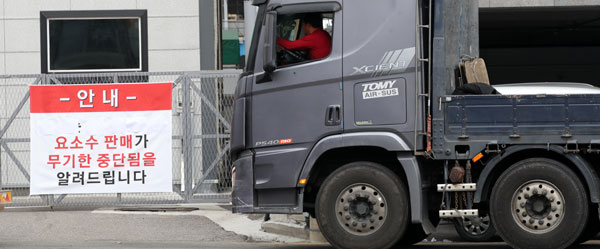
Despite being in an era of a smooth logistics system, we have experienced the shock of shortages; not being able to buy or having to wait days for masks, smartphones, etc. Shortages occur when demand is greater than supply. There are various reasons for the shortage; lack of labor force, lack of materials, circulation problems, and sometimes it is just a kind of marketing. For whatever reason, shortages continue to occur, and we must seek the causes and measures to be taken. Here are two shortage cases that occurred recently.
Diesel exhaust fluid shortage
On Oct. 11, Chinese customs officials announced regulations adding pre-export inspection procedures for 29 items, including diesel exhaust fluid (DEF), also known as “urea water”. DEF is a key agent for the operation of diesel engine vehicles such as diesel freights and passenger vehicles. Diesel vehicles are required to be equipped with a selective catalyst reduction, a reduction system of waste gases. The main role of DEF is reducing nitrogen oxides to nitrogen, consequently reducing 80% of the air pollutants generated by diesel engines. Euro 6, a discharge standard, has been set since 2014, which requires diesel vehicles to use DEF to minimize nitrogen oxide emissions.
DEF is a mixture of urea and purified water, and urea is a compound of carbon dioxide and ammonia. When producing ammonia, hydrogen is used. There are two main processes for producing hydrogen: fossil fuels and electrolysis. Since it is uneconomical to produce hydrogen by electrolysis, most hydrogen production relies on fossil fuels. Coal gasification is the main process to produce hydrogen, and China accounts for 44.7% of the world’s coal production. Until now, China has been producing most of the hydrogen needed in the production process of DEF.
Korea has been importing 97.6% of DEF ingredients from China, and accordingly, China’s export regulations caused a major setback in the production and circulation of DEF in Korea. Moreover, the circumstance in Korea—a high proportion of diesel vehicles at about 40%, and no domestic urea producing companies—intensified the shortage. Experts point out that the problem is not just the shortage of DEF, but Korea’s dependence on a sole country. They stressed that in the case of items that rely on imports by more than 70%, “strategic materialization” must be done: diversifying imports or increasing inventory.
Semiconductor shortage
During the last year’s COVID-19 pandemic, semiconductor production shrank worldwide, but as the world economy is recovering this year, the demand for semiconductors is soaring. However, the shrunk supply could not meet the sudden increase in demand, causing a shortage of semiconductors in the automobile and electronics industry.
Hyundai Motor’s car sales by 19.4% on global markets compared to last year. Kia Corporation also showed a fall of 14.1% in international sales. These corporations suspended the operation of their assembly lines due to the shortage of automotive semiconductors since January. Samsung Electronics also suffered from the supply shock. The release of the Galaxy S21 smartphone was delayed due to the semiconductor shortage. More worrisome is that the shortage shows no signs of recovering anytime soon.
A report released by the Korea Automotive Technology Institute on Nov. 8 suggests that companies that need semiconductors should make long-term plans to expect demand for semiconductors and share the expected demands with domestic suppliers. The report stressed that semiconductor producers should actively develop and invest through coalition and cooperation with the automobile industry, and the government should show continuous interest in the semiconductor industry.
The shortages of industrial goods cause significant social impact because it mainly causes a shortage of intermediate goods related to the production and circulation of final goods. In particular, the shortage of DEF and semiconductors may cause temporary paralysis of the transportation and logistics business. If the shortage becomes severe, even industries close to daily life, such as the delivery and the parcel service industries, can be paralyzed. There are various causes of shortages, but they are generally predictable and preventive measures can be developed. The industry and the government should prepare to prevent shortages and to respond appropriately to their occurrence.


